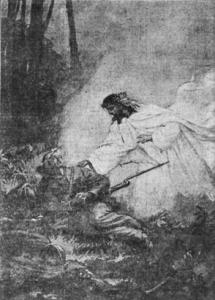What does Plato mean when he speaks of the known unknown, the beloved, the One we love without knowing His name?
Plato never, quite, says. He knows this love is most divine, but Plato never quite calls the object of all our desires “God.” How could he?
The gods of Homer and traditional Greek religion were not worthy of worship. If Plato cleaned them up, and he tried, then he had cleaned them up. The Zeus that you make worthy of worship is less than you and so is not worthy of a free man’s worship!
Plato understood that there must be something more. The love he felt, that motivated his dialogues, was of something, something sufficient to generate this passion in him. The gods were not God, because they were not all goodness, all truth, and utterly beautiful. The captivating nature of God revealed all the Homeric gods to be wicked, false, and ugly.
Plato ended with stories told by a dying man coming back to life to report that there is justice in the life to come. All actions that appears unjust is confirmed to be just, all that should be forgotten is, and nothing is lost that should be retained. Plato had spent most of Republic demonstrating that justice was good for its own sake and not just for good outcomes. He ended Republic with the extravagantly good news that justice was also rewarded for all eternity.
Plato loved justice as much as any man that ever lived. He loved wisdom and the Good. Looking at us, humans, Plato could not imagine that the Good, if God, could ever love us. Like his greatest student, Aristotle, God was beyond us and so God can only worthily think of God! God is all and so God need not condescend to us and might even be wicked to notice us. This is all reason can deliver to us: we are not much. Why would Divine Beauty notice us?
What Plato forgot was that a being, even the Being, in love can choose to love and that love need not be measured by equality. Numbers are equal, but love is not based on anything that can be counted. Love is not based on power, knowledge, or even goodness. All these qualities can be enumerated, but love cannot be counted. Love calls the Lover to the beloved, based on the nature of the Lover. The Divine Lover gives Himself to the beloved and that is all that matters as far as “qualifications” matter. In humankind, love can go awry, but in God, all good, His will is pure.
If God consents to love, if and only if love is good. God would only consent to a love that is good! This is the beautiful circularity of divinity: love begetting love into eternity.
God was our creator and God chose to love His creation. He did not need to do so, love being based on consent, but God did. This was and is unexpected glory! God notices humankind! God loves God’s creation, since as a being whose nature is Love, God made a lovable cosmos. The part of the creation that is most like God, humankind, was made most lovable. God chose to love us in the very way He made us: we are loved from the foundation of the world. We are fallen, but that is nothing to the Divine Lover. His absolute romance gave Himself to salvaging us.
The Christian good news that Plato could not see is that the Beautiful, the very Word of God, came at Christmastide by His own choice! Angels sang. A manger was sanctified. All was joy to the world:
“And the Word was made flesh, and dwelt among us, (and we beheld his glory, the glory as of the only begotten of the Father,) full of grace and truth.” (John 1:14)
This choice enabled all humankind to see the grace and truth of Father God. The Creator of the cosmos acted in solidarity for us out of love. Love is motivated by beauty and God had created us in His image. Even the shattered image of God was enough for God to choose to love us and so Jesus came. The Word became flesh. We can see this Icon of God and imitate Him.
Naturally, the Word is also one in essence with the Father and so when we imitate the Word, we imitate the Father. Where do we get this power of becoming like God? This ability comes from the Creator: of “thine own have we given Thee.” From the beginning, the Creator made humans in His image. Our parents, Adam and Eve, turned from God, but this could not utterly obliterate what God made. Even the shards of a broken mirror can still reflect the light and so every human being carries within himself or herself the possibility of reflecting the True Light. This beautiful reflection cannot save us, we are still broken and in need of the grace of God, yet even a brief reflection of His light from our souls is more beautiful than the light of the stars.
We are objectively beautiful, but this is not a beauty apart from God. This is good on God’s part, because the good God built beauty into the very heart of creation. He reacts to His own choice and loves us. As with Mary, we are given a chance to consent or reject what God gives.













